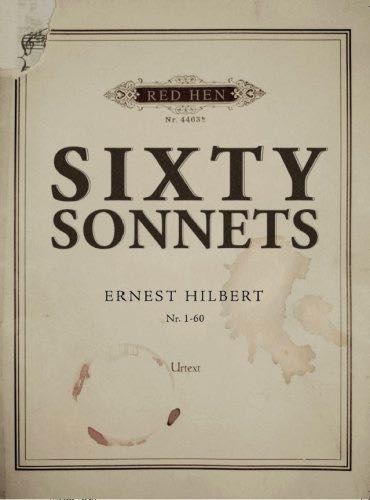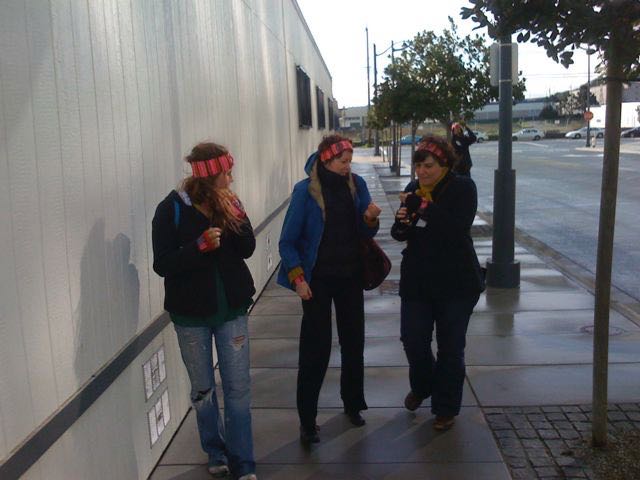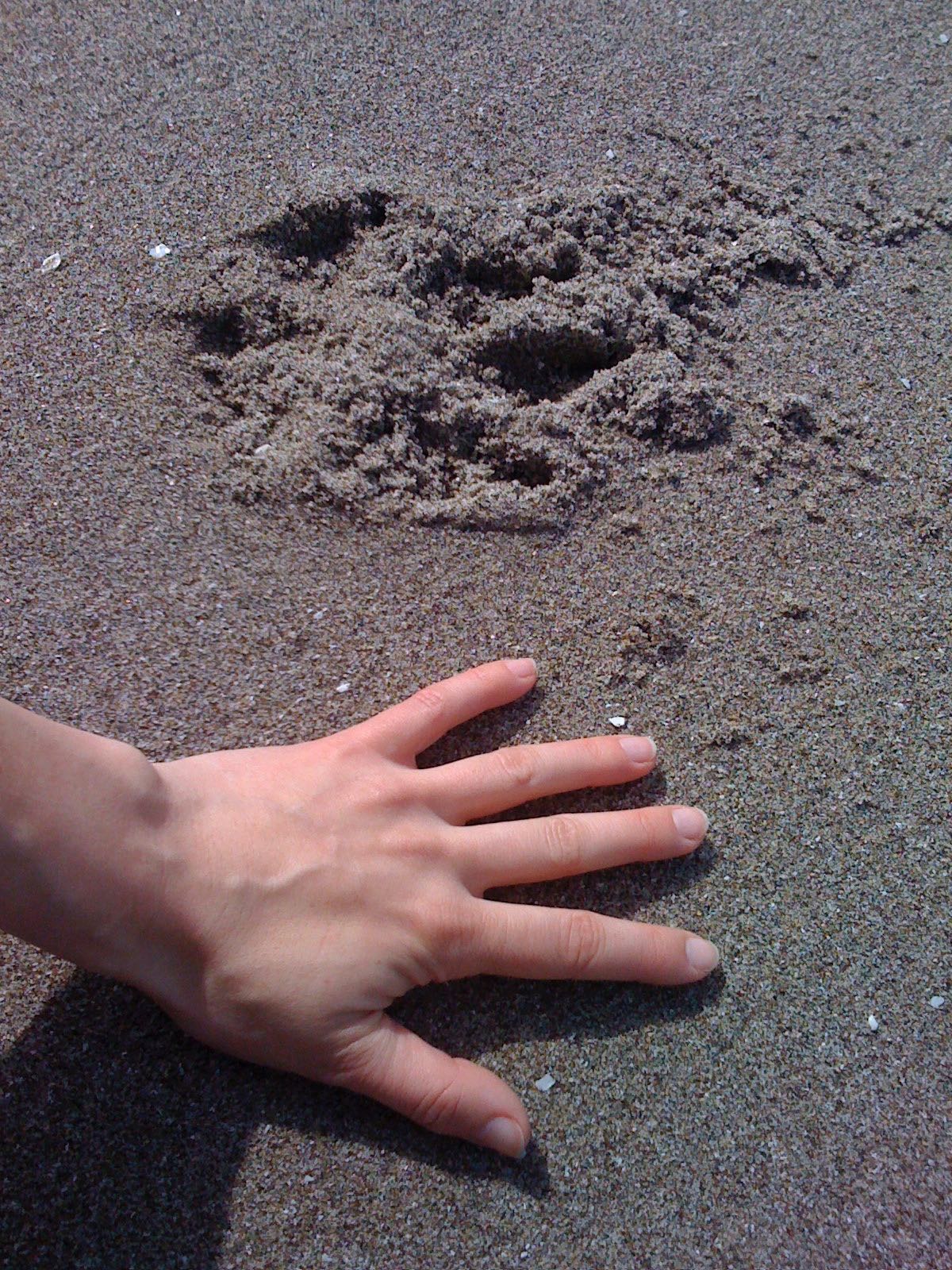
January to March 2009

28 March 09
Jack Womack :
“ I FEEL AS THOUGH THE CARNIVAL HAS LEFT TOWN
“ If you go out to the field where they set up, there's trampled grass,
crumpled programs, pieces of popcorn, empty Lung-Kuro bottles, and, mysteriously,
a paisely ascot, stained with some unspeakable and possibly reptilian ichor.
“ Mr. Womack and his fabulous Borgesian Book Show have moved on, taking
the girl gangs of New York, the flat earthers, and the sex aliens with them.
“ Dang.
“ That was awesome.
“ Thank you, Jack. ”
— William Gibson
Novelist and collector extraordinaire of weird books, Jack Womack, author of Random Acts of Senseless Violence and Elvissey , just finished a stint displaying selections from his library on William Gibson’s blog, 14-23 March 2009, link here (be prepared for a surprise).
“ Author, title, and the jewelly festival number — ”
Kelly Link, Magic for Beginners (Small
Beer Press, 2005), p. 227
27 March 09
Eric Gill

The catalogue by Sophie Schneideman (115 items) comprises material from all phases of GillÍs career, with a rare and beautiful proof of GillÍs “ The Invisible Man ” (1925), and this one item that seems whimsical and emblematic of the Gill-Pepler-Johnston community :

“ The Invisible Man ” (no. 77 in the catalogue) is kinetic and immediately recognizable as by Gill, yet at the same time a little more playful than some of his work from this period :
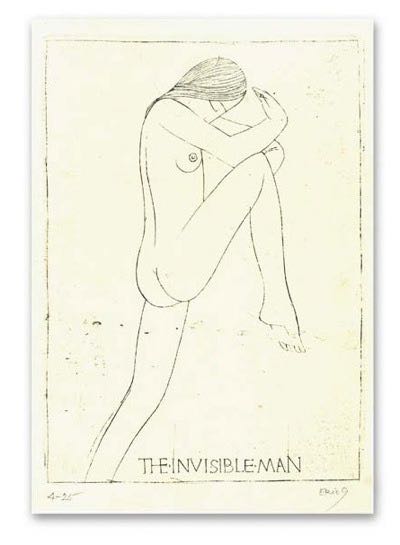
Next week is also the New York Antiquarian Book Fair
at the Park Avenue Armory, Thursday 2 April through Sunday 5 April.
See you there.
24 March 09
Rhododendrons, again :
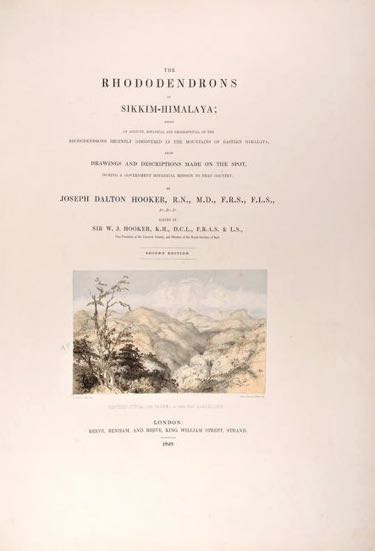
Title page
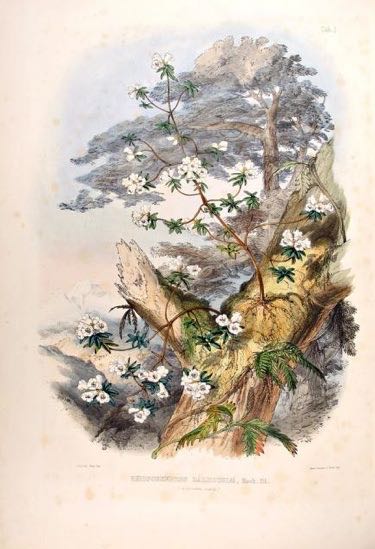
It’s been some years since I had a copy of this beautiful book in my hands : as I recall, one plate (which I cannot, alas, find to reproduce) illustrates a variety found at 18,000 feet, and only from the printed description does one learn that the blossoms are minute in size and emerge through the snows. Perhaps I have the altitude wrong, but in the Himalayan Journals (1854) Hooker describes what he sees above 13,000 feet elevation : “ Black tufts of alpine aromatic rhododendrons of two kinds (R. anthopogon and setosum ), with dwarf juniper, comprised all the conspicuous vegetation at this season. ”
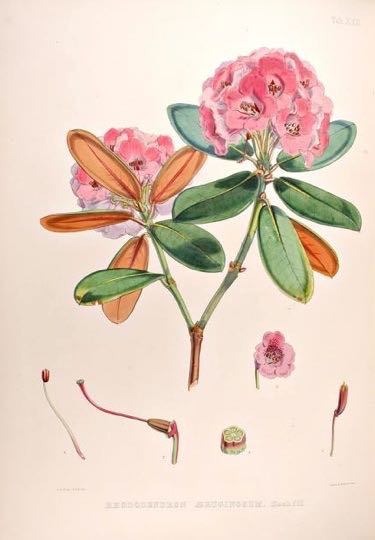
20 March 09
Sixty Sonnets (again) :
from Sixty Sonnets . Copyright © 2009 by Ernest Hilbert. Reproduced by permission of the author.Song
A song for those who learn forgotten, slow
Skills, crafts submerged long past by massed commerce,
By hard, dark, oily machines, and the din
Of duplicates shipped by the millions, stowed
In cavernous depots to be dispersed
To each home, used once, and then binned.
This is for those who weave by hand, who brew
Their own suds, and roll their own smokes, hammer
Together shelves, print on presses, plant gardens
In vacant lots, raise beams, fire pots, the few
Who challenge the swift, transient tenor
Of the age, the lonely sincere wardens,
The last, noble pull of old ways restored,
Valued and unwanted, admired and ignored.
The Endless Bookshelf and the hand bindery of Temporary Culture adopt this Song as anthem.
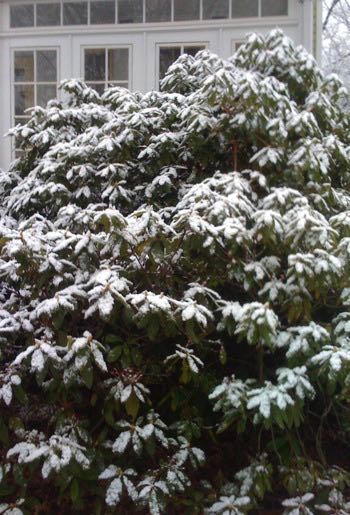
The Snow-Rhododendrons of Montclair-Himalaya (hommage to J. D. Hooker *)
* The Rhododendrons of Sikkim-Himalaya ; being an account, botanical and geographical of the Rhododendrons recently discovered in the mountains of eastern Himalaya, from drawings and descriptions made on the spot, during a government botanical mission to that country . . . Edited by Sir W. J. Hooker. London: Reeve, Benham, & Reeve, 1849-1851. Hand-coloured lithographs by John Nugent Fitch from drawings by J. D. Hooker. A beautiful book.
19 March 09
Sixty Sonnets
I was delighted to receive this morning an inscribed
copy of Sixty Sonnets by
Ernest Hilbert (Los Angeles : Red Hen Press, [2009]). I resisted
digging into the book for most of the day, but I can longer. There’s
a sharp intellect at work (and a keen ear) and I love the range of
allusion and citation. I cite two passages that caught my eye and ear
and suggest the book’s entwined playfulness and purpose :
from “ AAA Vacation Guide ” :
[ . . .] Let’s get real.
Most places on the map, you must believe,
No one wants to visit, only to leave.
and from “ Genealogies ” :
Two generations back my short file stops.
This slender family branch must have once led
To trunk if not root. What strange folk were we?
Gangsters and seamstresses, what bizarre links,
Smiths and sylphs, deacons and drunks, kings and finks.
I will be reading this book, and looking forward to hearing the author read
from it ; I will not be reviewing this book, for I published a sonnet
by my friend Ernie Hilbert last year : All
of You on the Good Earth. But Sheila
O’Malley has some perceptive insights into the book :
I would say that what Hilbert pulls off here is what James Joyce pulls off in the astonishing last four paragraphs of “ The Dead ”. That’s what it feels like: the consciousness going from microscopic to macroscopic, moving from detail to universality — and there is pain and loss and grief in the transfer, because it is in those moments that we become aware of our mortality. But, very important: there’s not only loss being expressed. And that’s one of the things I think is sometimes missing in the understanding of what Joyce does in those last four paragraphs, and I think is essential to understanding Hilbert’s work, too: ultimately, it's about love. It’s not a love that is cozy, or domestic. It’s a love that is rather searing, almost unbearable, hopeless, really, because it comes out of acute self-awareness.
15 March 09
Signs of spring

Michael Swanwick published a short-short story with related photograph : Bradbury Jar 2.0 is brilliant and its associated container is concrete and essential. This is also a poem : not one single word out of place. Form is function.
28 February 09
Current reading :
— Uwe Tellkamp, Der Turm. Geschichte aus einem versunkenen Land.
Suhrkamp, [2008]. Der Turm is a modernist encyclopaedic novel, utterly
interesting and very complex, with a taxonomic cast of characters and an almost
tiresome duty to provide details of life in Dresden in the early 1980s. Every
thing seems to find its way in — even the Leipzig Messe (publishers fair) — but
at times the author’s gaze lingers over long. Events in the characters’ lives
are moving toward crisis. I am about halfway through the book, an engaged reader,
reading with equal parts interest and effort.
— Duncan Wu. William Hazlitt. The first modern man . Oxford
University Press [2008]. I have just started reading this : well written and rich
with episode and appearances by Coleridge, Wordsworth, Lamb, &c, &c.
Recent reading :
— Christoph Hein, Der fremde Freund (1982). I really like
this book : one actually hears the voice of the doctor and her solitude
is utterly tactile. Very interesting and not a single superfluous word. I also
like the narrative mode, retrospective but present, that is to say : one
knows from the beginning that her friend Henry is dead but their relationship
is experienced by the reader as it develops, day by day, the ambivalences and
pleasures are lived with month by month, until the death occurs : all the
more unexpected and appalling for having been announced.

— Andrés Ibáñez, El perfume del cardamomo. Cuentos chinos. Con una introduccíon de Félix Romeo. Impedimenta, [2008]. 152, [2] pp. Short stories, vignettes, chinoiserie dreams. A handsomely designed, pleasing, and playful book, hommage to the idea of classical Chinese narrative forms, with a few passages where the author attains the gnomic ideal :
El tigre y el dragón
El dragón contempla el mundo desde lo alto de las nubes. El tigre duerme tranquilo a la sombre de una acacia. Un pájaro azul cruza los aires. ¿ Es el sueño del dragón, que desearía ser capaz de descender a la tierra, o el sueño del tigre, que desearía ser capaz de alcanzar los cielos ? (74)
28 February 09
Current reading :
— Uwe Tellkamp, Der Turm. Geschichte aus einem versunkenen Land.
Suhrkamp, [2008]. Colossal novel of life in Dresden in the early to late 1980s,
some unusual stylistic touches and an interesting range of characters ;
the narrative sometimes drowns under the enumeration of stuff from the lost world
of the DDR but has just taken a swerve into soap-opera complexities that seems
likely to move things along.
Recent reading :
— Christoph Hein, Der fremde Freund. Drachenblut. Novelle [1982 ;
Suhrkamp taschenbuch, 2002]. Brilliant short novel of life in Berlin and environs,
a chilly and utterly compelling narrative voice. Life in the DDR as it really
was lived.
Pictures from the end of the world
Article in the Daily Mail for Saturday 28 February about a Bristol warehouse abandoned by its occupants (online booksellers) when they lost their lease (courtesy of Bruce Sterling).
Weedwalk :
Book Walk 2
Small and dedicated gathering for the second biennial Weedwalk : Book
Walk at the edges of the biotech construction site, with festive headbands
and wristlets. The customary photographer for the Weedwalks arrived unarmed
and so the project was less fully documented than other events have been.
We identified a number of local and invasive plants (including hemlock, shown
below) and moved through the city at a walking pace. See you at the next
Weedwalk.
(look back at the 2007 event here)
Words & Languages
An excellent Tibetan language input java-y thing, jskad, with the elegant and accurate T. Duff designed font, available here.
Wolfspfotenphoto
Not every day does one see a wolf on the beach, being walked on a lead. Huge, magnificent, archetypal, and immediately recognizable (although I had never seen one before). Perhaps the next time I see one, I will remember to take a photograph of the beast and not merely the mark of its Pfote.
13 February 09

At the California International Antiquarian Book Fair in San Francisco.
Yesterday at a friend’s shop I found this Philip Whalen poem
and feel an affinity across the decades ! The original manuscript
is 11 x 17 inches.
Weedwalk tomorrow, Saturday
14 February, 9:30 a.m. :
“Book walk is back. Volume 2 will be louder than last time, inevitably
faster and hopefully as much fun. Guest biped Henry is back in town. We’ll
meet at 3rd and 16th, near the new biotech area, formerly wasteland, to see what
we find. are there any weeds left. Bring love poems or other things to read.
This is Saturday morning at 9:30 am, rain or shine. hope you can come.”
11 January 09
Current Reading :
— Berlin Noir. March Violets. The Pale Criminal. A German Requiem by
Philip Kerr (Penguin Books paperback, [1993])
— The Good Physician by Kent Harrington (Dennis McMillan,
2008)
— Dombey and Son by Charles Dickens (bound from the
monthly parts published from 30 September 1846 to 31 March 1848)
This creaking and constantly evolving website of the endless bookshelf : I expect that some entries will be brief, others will take the form of more elaborate essays, and eventually I will become adept at incorporating photos or comments and interactivity. Right now you’ll have to send links to me, dear readers. [HW]
electronym : wessells
at aol dot com
Copyright © 2009
Henry
Wessells and individual contributors.
Produced by Temporary
Culture, P.O.B. 43072, Upper Montclair, NJ 07043 USA.

